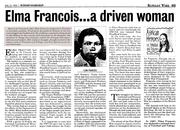From picking up cotton at a very early age to see herself through school to becoming a national hero and symbol of resistance, Elma Francois’ story is one that shows the struggle of not only blacks in Trinidad and Tobago but the struggles of black women in the Caribbean who are vulnerable to social injustices.

Her life and works have been overshadowed by others but Elma Francois was very influential and believed that black workers deserved to be treated better.
Born in 1897 in St Vincent, Elma lived with her parents who worked odd jobs to survive. Although several blacks had since gained their freedom, several still had to work for white masters and survive on very meagre salaries due to the racism and bad treatment they endured. To help her mother make more money, Elma worked with her as a cotton picker on cotton plantations while she attended school.

After the death of her father, she could no longer afford school and opted to find work instead. Knowing how hard it was to be black and employed, Elma struggled to find work but kept on pushing until she found one in sugar factory to support a baby boy and mother. While working at the Mt. Bentick factory, Elma made efforts to organise the workers to form a union and work against their employers who were treating them unfairly. However, her efforts and boldness soon left her unemployed again.
In 1919, at the age of 22, Elma decided it was best to find work elsewhere and moved to Trinidad and Tobago leaving her 2-year-old son and mother in St Vincent. She soon found work as a domestic worker at the Stollymeyer Castle and joined the Trinidadian Workingmen’s Association (TWA) but left due to differences she had with the members and the lack of a better representation of women.

While working as a domestic worker, Elma educated herself and read laws around workers and in her free time would walk the streets to preach to women about the need to stand up for themselves and demand better treatment when it came to employment. She also stressed on black workers fighting for their rights and soon became a threat to white employers and the government.
Elma would go on to become known as Comrade Francois and establish the National Unemployed Movement later known as the Negro Welfare Cultural and Social Association (NWSA). The association not only registered unemployed blacks and found work for them, but it also registered employed blacks to come together and fight for their rights. In 1935, she led ship workers to demonstrate and refuse to load ships headed to Italy until their needs were met.

In 1937, seeing that her efforts although good were not getting anywhere fast enough, Elma together with other brave workers started a black employers demonstration which developed and became known as the Butler Riots. The Butler Riots would spread to other parts of the Caribbean such as Jamaica, Barbados, Grenada and British Guyana.
Elma Francois managed to inspire workers in Trinidad and Tobago to go on strike and this spread through other countries until she was arrested. Through her in-depth reading of the law, she was able to defend herself in court and escaped jail time after being tried for sedition, the first woman in the Caribbean to be arrested for such a crime.
Threats and warnings from the police and government did not scare Elma as she spent the rest of her life fighting for workers. Through her works, several workers unions were established and blacks found the power in unity and demanded better pay. Women also gained more employment.

In the 1940s, her work was brought to a halt after she developed a goitre. A few months after her son joined the army to fight in the war, Elma passed away at the age of 27 in 1944. Although her goitre became very serious, several sources speculate that the pain of seeing her son fight for the British who she fought against caused her death as well.
To date, she is celebrated in Trinidad and Tobago as a national heroine. September 25 is celebrated as Elma Francois Day as it was the day she was declared a national hero in 1987.










